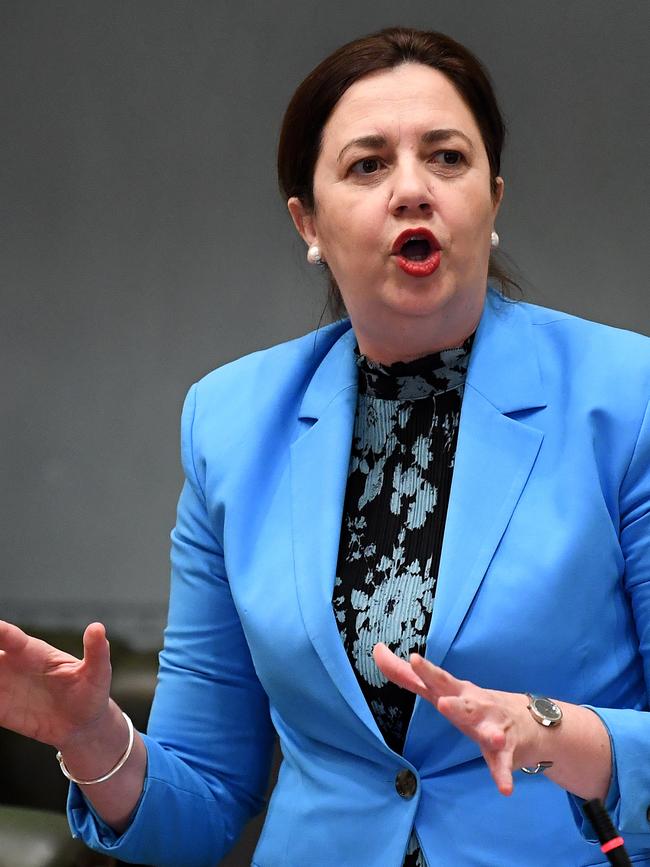Voluntary assisted dying Qld laws move closer but regions at risk
Terminally ill Queenslanders may soon be able to legally end their lives, but there are doubts how regional citizens will fare.
QLD Politics
Don't miss out on the headlines from QLD Politics. Followed categories will be added to My News.
Terminally ill Queenslanders are one step closer to being able to legally end their lives after historic voluntary assisted dying legislation was introduced, but those living in the regions could be left severely disadvantaged unless the Commonwealth amends its legislation.
Under the sweeping reforms, voluntary assisted dying will only be available for Queenslanders who are expected to die within 12 months from a condition they consider intolerable.
And it will not be available to someone only because they have a disability or mental illness.
But it’s not known how the scheme will be available to people in regional, rural and remote areas, with the Commonwealth yesterday saying it had no plans to amend its Criminal Code.
Currently under the code, it is illegal to use a phone, videoconference, email or other electronic communication to publish or distribute material that counsels or incites committing or attempting to commit suicide.
Premier Annastacia Palaszczuk said she had written to Prime Minister Scott Morrison requesting the Federal Government urgently amend the Code.

“Given Queensland‘s geography, it will be difficult for any voluntary assisted dying scheme to ensure equity of access for people in rural and remote areas while the Commonwealth Criminal Code provisions remain in place,” she said.
But a spokesman for federal Attorney-General Michaelia Cash said the government had “no plans” to amend the suicide related material offences in the Criminal Code.
“It is the responsibility of states to ensure their laws are compatible with Commonwealth laws,” he said.
The Commonwealth has not amended the criminal code despite similar concerns from Victoria and Western Australia, where voluntary assisted dying has already been legislated.
QUT mental health law expert Dr Katrine Del Villar said changing the law would be the primary solution, but if that didn’t happen there is an alternative that could “give comfort”.
It would be for the Commonwealth Director of Public Prosecutions to issue guidelines saying they would not prosecute people under the code if they’re participating in voluntary assisted dying in line with state laws.
Ms Cash’s spokesman said prosecutions, ultimately a matter for the independent DPP, had to be in the public interest, among other factors.
The proposed Bill was yesterday referred to the parliamentary Health and Environment Committee to consider over the next 12 weeks.
The laws will be debated during September’s sitting week and if passed, will begin in January 2023.
As part of the law’s safeguards, anyone found to have coerced a person to either make or revoke a request to access voluntary assisted dying will face up to seven years behind bars.
And if an unauthorised person administers the substance, they will face a maximum jail sentence of 14 years.

Under the laws, the person accessing voluntary assisted dying must be able to make their own decision at the time the substance is administered.
They must have been diagnosed with a disease, illness or medical condition that is advanced, progressive and will cause death.
The Premier said the 12-month time frame made it clear that the scheme was only an option for people who were at the end of their life.
A person’s decision-making capacity will be assessed multiple times and they must also be assessed as having acted voluntarily and without coercion.
They will need to complete a staged request and assessment process which will be undertaken by two qualified doctors.
If one of those doctors is unsure about whether the person has decision-making capacity or whether they are acting voluntarily, they must refer them to another practitioner.
A person will be required to make three separate requests and can change their mind at any time.
Under the proposal the substance will be able to be administered by the person themselves or by a practitioner.
Nurse practitioners and registered nurses will also be allowed to administer it – hereby allowing for greater access in rural and remote areas where there are less medical practitioners.
Health workers will not be allowed to initiate a discussion about euthanasia to a person – unless at the same time they inform them about the treatment options available including palliative care and the likely outcomes.
This prohibition will apply to anyone who provides health services or professional care services to a person.
Health practitioners won’t be forced to participate if they don’t support voluntary assisted dying but in these cases they will need to inform the person of their refusal, the reason for it and information around how they can access it.
An entity won’t be obliged to provide it.
The Premier, who in past year has lost both her grandmother and her uncle, said she felt it was the right time for the Bill.
“It is about giving people autonomy to make their own decisions about their end of life,” she said.
“Most importantly, it is about compassion in the face of suffering, and it is about Queenslanders supporting individuals to make these choices for themselves.”
Clem Jones Trust chair David Muir said it was vital that Queenslanders told their local MPs about their views.
“VAD advocates are confident that if any such MPs come to the issue with an open mind, they will vote for voluntary assisted dying,” he said.




